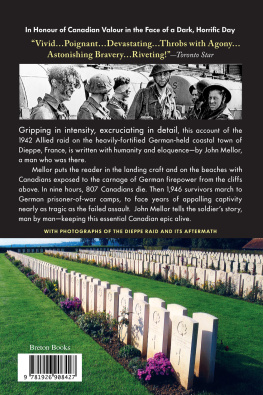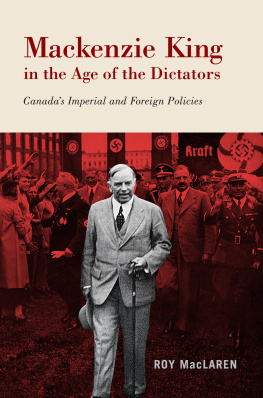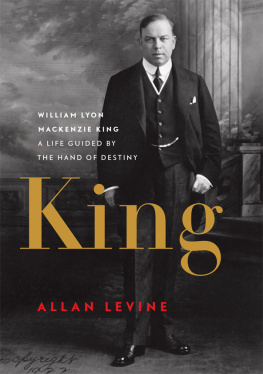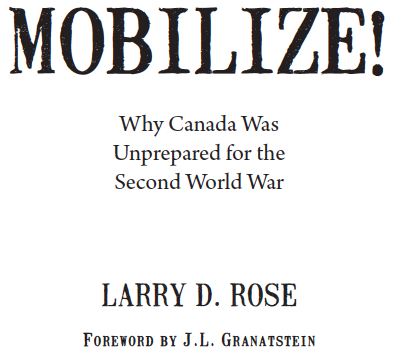History with its flickering lamp stumbles along the trail of the past, trying to reconstruct its scenes, to revive its echoes, and kindle with pale gleams the passion of former days.
Foreword
T he Second World War was unquestionably the greatest national effort of the Canadian people. With a population of only 11 million, Canada put 1.1 million men and women in uniform, fielding the third largest air force and the fourth largest navy in the world, and a powerful overseas army of two corps with five divisions and two additional armoured brigades. The casualties were terrible, but significantly lower than in the Great War, and there was better care at every level than in the first conflict.
At the same time, Canadian industry produced the goods, churning out trucks and tanks, aircraft and ships, and armaments, shells, and bombs of every type. Farmers, miners, and forestry workers did their mighty bit too, and Canada supplied its own people with food and much of the Allied world too. Moreover, the nation became so wealthy it could give away billions of dollars to its allies. The Gross Domestic Product doubled between 1939 and 1945, reaching some $11.5 billion, there was full employment, as much overtime work as everyone could handle, and families actually ate better than in the Thirties, despite food rationing. It was an exceptional period, the years when Canada altered almost completely.
No one could have predicted this turnaround in the 1930s. The Great Depression had sucked the life out of the nation. Unemployment in some years reached 25 percent, there was no state system of welfare, and men roamed the country, hitching rides on boxcars in search of work that could earn them enough for a meal. Provinces defaulted on their bonds, political parties peddled fanciful nostrums, and the nations leaders had no real answers to offer to the crisis, most cutting government spending and hoping for an economic miracle that never seemed to arrive.
In such straitened circumstances, it was not surprising that Canadas military sank into utter irrelevance. The great host that had emerged from the Great War in 1919 was no more, though much of its equipment, now obsolete, still filled militia armouries. The regular army numbered only a few thousand, the navy and air force together adding another 5,000 to 6,000, and the reserve forces were completely untrained. There was literally no modern equipment no tanks, no light machine guns or anti-aircraft weapons, and the Royal Canadian Air Force still flew biplanes. The Royal Canadian Navy did have a few modern destroyers, but few was the operative word.
None of this would have mattered if the world had been peaceful. But the 1930s was the heyday of dictatorships. In the Soviet Union, Josef Stalin ruthlessly killed his opponents, spread subversion around the globe, and built a huge army. In Italy, Il Duce, Benito Mussolini, attacked Ethiopia, and postured on the world stage. In Spain, the fascist leader General Francisco Franco crushed the legitimate governments forces and wreaked vengeance on trade unionists and democrats. In Japan, the army attacked China and made its plans to conquer Asia. And in Berlin, Adolf Hitler, the Fuhrer, was making Nazi Germany, allegedly disarmed after its defeat in the Great War, into the most formidable military power in world history.
Canada preferred not to look. The nation and its leaders, nominally independent of Britain since the Statute of Westminster in 1931, turned their eyes away from developments abroad and looked inward. There was no money to prepare for war, and even if there had been, Canadians were sadly divided. French-speaking Canadians still smarted from the wounds of conscription in 1917 and 1918, and the idea of going to war again had no support from the Church, business, the young, or the provincial government. Indeed, many young Quebecois looked to fascist Italy as a model worthy of emulation in Rome, at least, there was order and support for traditional values. In English Canada, opinion also was divided. Conservative imperialists still looked to Britain for a lead, but London was more than slightly uncertain of its course. Farmers worried more about the persistent drought than overseas adventures, students preferred peace to war, and voted for this in university debates. Few in Canada studied international affairs, many in the churches were outright pacifists, and hope for the League of Nations as a panacea still existed, despite all the evidence to the contrary of its ineffectiveness.
Curiously, few scholars have looked deeply at opinion and attitudes in Canada in the Depression years. They have studied politics and parties, but not ventured into analyzing why there was so little public pressure on government to make an effort to prepare the Canadian forces for the conflict that many could see approaching. It is time to lift the veil.









